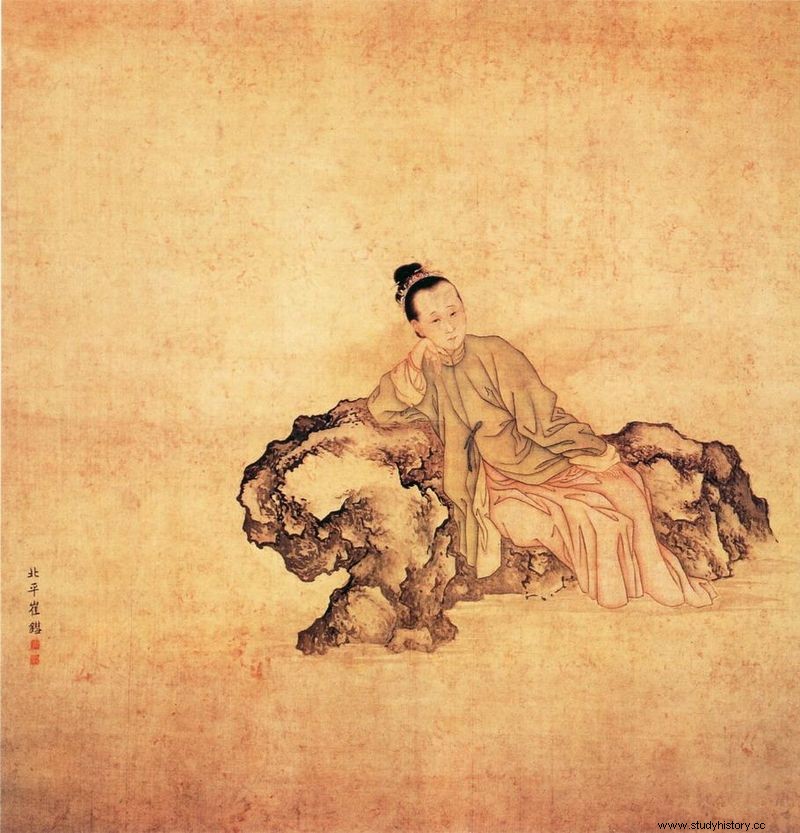Chinese author of the Song dynasty, Li Qingzhao (李清照, 1084 – c. 1151) is considered one of the greatest Chinese poetesses and a master of the art of the sung poem ci .
Daughter of a poetess

Li Qingzhao was born in 1084 under the Song dynasty, in Shandong, a province in eastern China at the time home to the imperial capital, Kaifeng. Both of his parents were educated and introduced to the literary and cultural circles of the time. At a time when few women benefited from an education, her mother was a known and recognized poetess. Li Gefei, his father, is a civil servant in the capital.
In this family of scholars, surrounded by books, Qingzhao receives an excellent education and studies in particular literature, history, calligraphy, music, painting. As a teenager, she showed an attraction as well as a real gift for poetry. At seventeen, his talent was already known and admired in the literary circles frequented by his father.
Zhao Mingcheng
In 1101, Qiangzhao married the epigraphist Zhao Mingcheng [English], with whom she shared a common passion for poetry. Imperial official, Mingcheng is obliged to be absent often but the couple is united and their understanding is also intellectual. Qiangzhao sends poems to her husband, who admires his wife's talent. She wrote many love poems, and in particular many ci :sung poems, written on an existing melody with fixed verses and rhymes, but irregular verses. Qiangzhao also participated in the epigraphy work of Mingcheng, who composed a Collection of epigraphy on metal and on stone in thirty volumes.
Despite the union of the two spouses, their families are experiencing serious dissension. Mingcheng's father, Zhao Tingzhi, appointed prime minister in 1101, was part of the reformist clan while Li Gefei was a conservative. The two successively fall into disgrace. Zhao Tingzhi died in 1107, and his son was sent to Qingzhou, Shandong Province. The couple is having a happy time, as evidenced by the poems they address to each other. In 1121, Mingcheng was appointed prefect of Laizhou, a city in the province, then of Qingzhou.
The Jin Dynasty

In 1115, under the leadership of their leader Jin Taizu, the Manchu people of the Jürchens revolted against their sovereigns, the Liao dynasty, and founded the Jin dynasty. The new dynasty quickly allied itself with the Song, longtime enemies of the Liao, and negotiated agreements with them providing for the return of territories controlled by the Liao.
Military failures among the Song as among the Jin, however, give rise to reluctance and complicate compliance with the agreement. After further negotiations fail, the Jin send an army to march on the imperial capital. This is the beginning of the wars between the Jin and Song dynasties, which will last more than a century.
Kaifeng was taken by the Jin in 1126, and the fall of the capital triggered an exodus south. For Qingzhao, the happy days are coming to an end. Forced to leave the capital, she joined her husband in Nanjing. Mingcheng was appointed prefect there, but he died in 1129, on his way to Huzhou for a new assignment.
The loss of her husband marks Qingzhao deeply, as evidenced by her work which is tinged with despair as she evokes the memory of her husband, the pain of widowhood and her horror of war.
Wandering and misery
Following the advances of the Jürchens, Li Qingzhao settled in ten cities before settling in Hangzhou, the new imperial capital of the Song since 1127. She remarried briefly to a man named Zhang Ruzhou, who mistreated him and whom she obtains the divorce after a few months.
The end of his life is not well known. Qingzhao left Hangzhou in 1134, joined his brother in Jinhua (Zhejiang province), and experienced a life of wandering and misery. The date of his death is not known. Li Qingzhao died around 1151. Although she published seven volumes of texts in prose and verse during her lifetime, only fragments of her work have come down to us:she leaves about sixty ci , nineteen classical poems and two fu , prose poems.
Li Qingzhao is considered one of the greatest Chinese poetesses.
Cinnamon flowers
Fifteen years ago,
under the full moon,
We wrote poems
celebrating the flowers.
Today, the moon and the flowers
are the same,
But how to find
the emotions of yesteryear?
